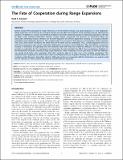| dc.contributor.author | Korolev, Kirill Sergeevich | |
| dc.date.accessioned | 2013-08-09T15:38:06Z | |
| dc.date.available | 2013-08-09T15:38:06Z | |
| dc.date.issued | 2013-03 | |
| dc.date.submitted | 2012-09 | |
| dc.identifier.issn | 1553-7358 | |
| dc.identifier.uri | http://hdl.handle.net/1721.1/79824 | |
| dc.description.abstract | Species expand their geographical ranges following an environmental change, long range dispersal, or a new adaptation. Range expansions not only bring an ecological change, but also affect the evolution of the expanding species. Although the dynamics of deleterious, neutral, and beneficial mutations have been extensively studied in expanding populations, the fate of alleles under frequency-dependent selection remains largely unexplored. The dynamics of cooperative alleles are particularly interesting because selection can be both frequency and density dependent, resulting in a coupling between population and evolutionary dynamics. This coupling leads to an increase in the frequency of cooperators at the expansion front, and, under certain conditions, the entire front can be taken over by cooperators. Thus, a mixed population wave can split into an expansion wave of only cooperators followed by an invasion wave of defectors. After the splitting, cooperators increase in abundance by expanding into new territories faster than they are invaded by defectors. Our results not only provide an explanation for the maintenance of cooperation but also elucidate the effect of eco-evolutionary feedback on the maintenance of genetic diversity during range expansions. When cooperators do not split away, we find that defectors can spread much faster with cooperators than they would be able to on their own or by invading cooperators. This enhanced rate of expansion in mixed waves could counterbalance the loss of genetic diversity due to the founder effect for mutations under frequency-dependent selection. Although we focus on cooperator-defector interactions, our analysis could also be relevant for other systems described by reaction-diffusion equations. | en_US |
| dc.language.iso | en_US | |
| dc.publisher | Public Library of Science | en_US |
| dc.relation.isversionof | http://dx.doi.org/10.1371/journal.pcbi.1002994 | en_US |
| dc.rights | Creative Commons Attribution | en_US |
| dc.rights.uri | http://creativecommons.org/licenses/by/2.5/ | en_US |
| dc.source | PLoS | en_US |
| dc.title | The Fate of Cooperation during Range Expansions | en_US |
| dc.type | Article | en_US |
| dc.identifier.citation | Korolev, Kirill S. The Fate of Cooperation During Range Expansions. Edited by Carl T. Bergstrom. PLoS Computational Biology 9, no. 3 (March 28, 2013): | en_US |
| dc.contributor.department | Massachusetts Institute of Technology. Department of Physics | en_US |
| dc.contributor.mitauthor | Korolev, Kirill Sergeevich | en_US |
| dc.relation.journal | PLoS Computational Biology | en_US |
| dc.eprint.version | Final published version | en_US |
| dc.type.uri | http://purl.org/eprint/type/JournalArticle | en_US |
| eprint.status | http://purl.org/eprint/status/PeerReviewed | en_US |
| dspace.orderedauthors | Korolev, Kirill S. | en_US |
| mit.license | PUBLISHER_CC | en_US |
| mit.metadata.status | Complete | |
